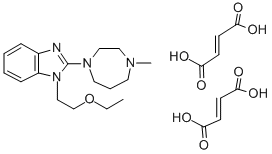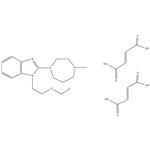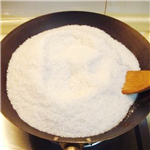Description
Emedastine difumarate, a potent H
1-receptor antagonist, was launched in Japan for the
treatment of allergic rhinitis and urticaria. Emedastine exerts its antiallergic effect via
inhibition of substance P-induced histamine release. It has been demonstrated both in vitro
and in vivo that this effect is mediated by the inhibition of Ca
2+release from extracellular
stores and of Ca
2+ influx into mast cells. In a clinical trial with bronchial asthma, emedastine
improved asthmatic symptoms in 55.3% of patients.
Description
Emedastine is a histamine H
1 receptor antagonist (K
i = 1.3 nM). It is selective for histamine H
1 over H
2 and H
3 receptors (K
is = 49 and 12.43 μM, respectively), as well as α
1-, α
2-, and β
1-adrenergic and dopamine D
1 and D
2 receptors, and the serotonin (5-HT) receptor subtypes 5-HT
1 and 5-HT
2 at 10 μM. Emedastine inhibits histamine-induced phosphoinositide turnover and intracellular calcium mobilization in primary human conjunctival epithelial cells (HCECs; IC
50s = 1.6 and 2.9 nM, respectively). It also inhibits histamine-stimulated secretion of IL-6, IL-8, and GM-CSF by primary HCECs (IC
50s = 2.23, 3.42, and 1.50 nM, respectively). Ocular application of emedastine prior to histamine challenge inhibits vascular permeability in guinea pigs. Formulations containing emedastine have been used in the treatment of allergic conjunctivitis.
Chemical Properties
White or yellowish powder
Originator
Kanebo (Japan)
Uses
Antihistaminic, H1-receptor; asthma prophylactic;
anti-allergic.
Definition
ChEBI: The fumaric acid salt of emedastine containing two molecules of fumaric acid for each molecule of emedastine. A relatively selective histamine H1 antagonist, it is used for allergic rhinitis, urticaria, and pruritic skin disorders, and
in eyedrops for the symptomatic relief of allergic conjuntivitis.
Manufacturing Process
Preparation of 2-(4-methyl-1-piperazinyl)benzimidazole. A mixture of 2-
chlorobenzimidazole (10.00 g) and N-mehylpiperazine (20.00 g) is stirred at
125°C for 5 hours. A 10% aqueous sodium hydroxide (100 ml) is added to the
reaction mixture, and the precipitated crystals are separated by filtration. The
filtrate is extracted with chloroform, and the chloroform extract is evaporated
to dryness to give the same crystals. The crystals are combined and
recrystallized from water-methanol to give 2-(4-methyl-1-
piperazinyl)benzimidazole (7.02 g) as colorless needles, m.p. 225°-226°C.
2-(4-Methyl-1-piperazinyl)benzimididazole (5.00 g) prepared as above is
dissolved in N,N-dimethylformamide (50 ml) and thereto is added sodium
hydride (concentration: 50%) (1.50 g) at room temperature, and the mixture
is stirred for 30 minutes. To the mixture is added 2-bromoethyl ethyl ether
(4.00 g), and the mixture is stirred at 70°C for 10 hours. To the reaction
mixture is added water (150 ml), and the mixture is extracted with ethyl
acetate. The extract is washed with water, dried over anhydrous magnesium
sulfate and then concentrated to give a brown oily substance (5.40 g). The
brown oily substance is treated with fumaric acid (3.26 g) in hot ethanol. The
crude crystals thus obtained are recrystallized from ethyl acetate-ethanol to
give 1-[2-(ethoxy)ethyl]-2-(4-methyl-1-piperazinyl)benzimidazole 3/2
fumarate (6.31 g) as colorless plates, melting point 167.5°-168.5°C.
Elementary analysis for C22H30N4O7: Calcd. (%): C, 57.13; H, 6.54; N, 12.11;
Found (%): C, 57.04; H, 6.44; N, 12.02.
1-[2-(Ethoxy)ethyl]-2-(4-methyl-1-piperazinyl)benzimidazole can be prepared
using 2-chloro-(1-[2-(ethoxy)ethyl]benzimidazole), (last one can be produced
from 2-bromoethyl ethyl ether 2-chlorobenzimidazole) and N-methylpiperazine
and fumaric acid there are obtained crude crystals, which are recrystallized
from ethanol to give 1-[2-(ethoxy)ethyl]-2-(4-methyl-1-
piperazinyl)benzimidazole 3/2 fumarate. This product has the same physical
properties as those of the product above described.
brand name
Emadine (Alcon);Daren;Remicut.
Therapeutic Function
Antiallergic, Antihistaminic
Hazard
A poison by ingestion.




